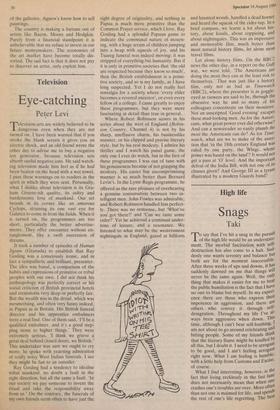Television
Eye-catching
Peter Levi
'Television sets are widely believed to be 1 dangerous even when they are not turned on. I have been warned that if you stroke the blank screen it gives you an electric shock, and an old friend wrote the other day to advise me to buy a negative ion generator, because television sets absorb useful negative ions. He said watch- ing television made him feel as if he had been beaten on the head with a wet towel. I pass these warnings on to readers in the spirit in which they were sent. Personally, what I dislike about television is its Gra- ham Greene-ish quality, its sultry and burdensome love of mankind. Our set broods in its corner like an amorous Cyclops, straining its one vast eye for Galatea to come in from the fields. When it is turned on, the programmes are too short, particularly the better advertise- ments. They offer encounter without en- tanglement, like a swift succession of dreams.
It took a number of episodes of Human Jigsaw (Granada) to establish that Ray Gosling was a consciously ironic, and in fact a sympathetic and brilliant, presenter. The idea was banal, a comparison of the habits and expressions of primitive or tribal peoples with our own. I did not think his anthropology was perfectly correct or his social criticism of British provincial hotels and crematoria very deep or perfectly fair. But the wealth was in the detail, which was mesmerising, and often very funny indeed, in Papua as in Britain. His British funeral director and his apprentice embalmers were a real find. One of them said, 'I'll be a qualified embalmer, and it's a good step- ping stone to higher things.' They were extremely serious. 'I think we grieve a great deal behind closed doors, we British.' This undertaker was sure we ought to cry more; he spoke with yearning admiration of really noisy West Indian funerals. I see they might be fun to an outsider.
Ray Gosling had a tendency to idealise tribal mankind, no doubt a fault in the right direction, but all the same a fault. 'In our society we pay someone to invent the ritual and take the responsibility away from us.' On the contrary, the funerals of my own friends seem often to have just the right degree of originality, and nothing in Papua is much more primitive than the Common Prayer service, which I love. Ray Gosling had a splendid Papuan game to indicate the communal nature of mourn- ing, with a huge scrum of children jumping into a heap with squeals of joy, and his Tuareg funeral was indeed moving: it was stripped of everything but humanity. But if it is only in primitive societies that 'the old are respected because they know so much', then the British establishment is a primi- tive society, and so is my family, as I have long suspected. Yet I do not really feel nostalgia for a society where 'every elder becomes a revered ancestor', or even every fellow of a college. I came greatly to enjoy these programmes, but they were more fascinating in detail than true in general.
Where Robert Robinson scores in his series about the west of England (Robin- son Country, Channel 4) is not by his sharp, uneffusive charm, his businesslike manner, or his clipped and precise literary style, but by his real modesty. I admire his thriller and I watch his panel game, the only one I ever do watch, but in the first of these programmes I was out of tune with his genuineness because of not grasping the modesty. His easier but uncompromising manner is so much better than Bernard Levin's. In the Lyme Regis programme, he offered us the rare pleasure of overhearing a genuine conversation between two in- telligent men. John Fowles was admirable, and Robert Robinson handled him perfect- ly. There was no nonsense, but 'What've you got there?' and 'Can we taste some cider?' Yet he achieved a continual under- tone of leisure, and a resonance. We listened to what may be the westernmost nightingale in England, gazed at hillforts
and haunted woods, handled a dead hornet and heard the squeak of the cider-tap. In a brief compass, we learnt a lot about his- tory, about fossils, about coppicing, and about nightingales. This was an impressive and memorable film, much better than most natural history films, let alone most travel films.
Let alone history films. On the BBC2 news the other day, in a report on the Gulf war, we were told, 'The Americans are doing the most they can at the least risk to themselves.' That was just like a history film, only not as bad as Timewatch (BBC2), where the presenter is as goggle- eyed as viewers are said to be, through the obsessive way he and so many of his colleagues concentrate on their monitors. Not an unscripted 'Good evening' escapes these mad-looking men. As for the Ameri- cans, what great power ever did otherwise? And can a newsreader so easily plumb the most the Americans can do? As for Time- watch, what are we to make of the asser- tion that 'in the 18th century England was ruled by one party, the Whigs, whose power was based on the land'? It would not get a pass at '0' level. And the important defeat of the India Bill, with not one of its clauses given? And George III as a tyrant illustrated by a modern Guards band?






































 Previous page
Previous page